Antibiotic resistance has emerged as one of the most pressing public health crises in recent years, challenging medical communities worldwide. A study published in the Environmental Monitoring and Assessment journal sheds light on this issue by investigating antibiotic-resistant bacteria in two critically important water bodies in Thailand: the Bang Yai Canal and Phuket Bay. Conducted by Phongphattarawat, Songvorawit, Khunsri, and their colleagues, the research unveils alarming data that could have far-reaching implications for both human health and environmental safety.
In the backdrop of urbanization and industrial activities, aquatic ecosystems often become receptors of various contaminants, including antibiotics that are commonly used in human and veterinary medicine. This research aims to assess the presence of antibiotic-resistant bacteria (ARB) in the Bang Yai Canal and Phuket Bay. Not only are these areas popular tourist destinations, but they also serve as vital sources of livelihoods for local communities, making the findings of this study critically relevant.
The methodology employed in this study was rigorous and comprehensive, comprising both water sampling and bacterial identification techniques. Researchers collected water samples at multiple points within the canal and bay, ensuring representation of different environmental conditions and anthropogenic impacts. This approach highlights the potential variations in antibiotic resistance patterns influenced by local practices and pollution levels. Subsequent microbial analysis was performed using advanced techniques, which may include selective culture methods and molecular tools to detect specific resistance genes.
The results of the study indicated a concerning prevalence of antibiotic-resistant bacteria, showcasing resistance to several classes of antibiotics that are used frequently in clinical settings. These findings have profound implications for public health, as exposure to such bacteria can occur through direct contact with contaminated water during recreation or through consumption of seafood harvested from these waters. The study raises critical questions regarding the safety of both local populations and tourists who engage in activities such as swimming and fishing.
Moreover, the presence of antibiotic-resistant bacteria in these aquatic environments raises alarm bells about the potential for horizontal gene transfer, where resistant genes can be passed among bacteria. This phenomenon exacerbates the existing problem of antibiotic resistance, as the spread of resistance traits may occur quickly and can affect a wide range of bacterial species, including those that are pathogenic to humans. Understanding the dynamics of resistance in ecological contexts is crucial for developing measures to combat this growing threat.
Environmental contamination with antibiotics can stem from various sources, including wastewater discharge, agricultural runoff, and even improper disposal of pharmaceuticals. The research team highlights that effective management strategies must be established to mitigate the entry of these contaminants into natural ecosystems. This includes stricter regulations against sewage overflows, the implementation of advanced wastewater treatment technologies, and public education regarding responsible antibiotic use.
The study also delves into the mechanisms that contribute to antibiotic resistance, stressing the need for ongoing surveillance to monitor the prevalence and spread of ARB. It emphasizes the importance of a One Health approach, which integrates human, animal, and environmental health, as stand-alone tactics will not suffice in addressing this multifaceted issue. Collaborative efforts among government agencies, health organizations, and communities are necessary to tackle the underlying causes of antibiotic resistance.
In discussing the broader implications of their findings, the researchers assert that immediate action is required to preserve the health of aquatic ecosystems and safeguard public health. By implementing comprehensive monitoring programs and reducing antibiotic releases into the environment, countries like Thailand can take proactive steps towards addressing resistance issues before they escalate.
The researchers believe that by raising awareness about the contamination of water bodies with antibiotic-resistant bacteria, they can prompt further investigation and stimulate public discussions regarding the responsible use of antibiotics. Indeed, greater community involvement and understanding are essential for fostering sustainable practices and protecting both the environment and human health from the impacts of antibiotic resistance.
This essential research presents a snapshot of the current state of antibiotic resistance in water bodies within Thailand, inviting a critical examination of practices that lead to resistance development. The findings stand as a clarion call to embrace better stewardship of our natural resources while ensuring public health remains at the forefront of environmental policy-making.
In conclusion, the study by Phongphattarawat et al. serves not only as a wake-up call but also as a foundation for future inquiries into antibiotic resistance in aquatic environments. With antibiotic resistance poised to become an even more significant public health threat in the coming years, immediate and concerted actions are necessary to curb its spread and protect ecosystems that are vital to human life.
The urgency of this research cannot be overstated, especially as the global community grapples with the looming specter of antibiotic-resistant infections. Collaborative and innovative solutions, alongside intensive public awareness campaigns, may hold the key to a future where both human health and the environment are safeguarded from the terrifying consequences of antibiotic resistance. Without concerted efforts, we risk entering a post-antibiotic world where common infections may once again become life-threatening, underscoring the importance of understanding and addressing this critical issue.
Subject of Research: Antibiotic-resistant bacteria in aquatic ecosystems
Article Title: Antibiotic-resistant bacteria in the Bang Yai Canal and Phuket Bay in Phuket Province, Thailand
Article References:
Phongphattarawat, S., Songvorawit, N., Khunsri, S. et al. Antibiotic-resistant bacteria in the Bang Yai Canal and Phuket Bay in Phuket Province, Thailand.
Environ Monit Assess 197, 1132 (2025). https://doi.org/10.1007/s10661-025-14573-7
Image Credits: AI Generated
DOI:
Keywords: Antibiotic resistance, Bang Yai Canal, Phuket Bay, Environmental Health, Public Health, One Health Approach.




